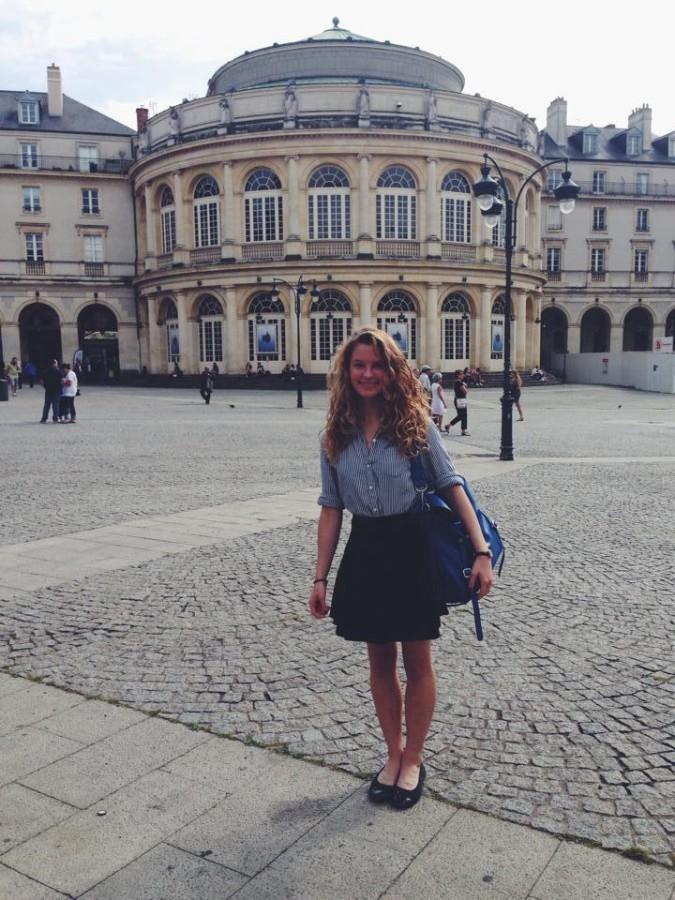The shock of arrival in France: C’est la vie
By Kaitlyn Tice
I love the moment when the plane first touches down on your destination, especially on an overnight flight. You go to sleep on one side of the ocean and wake up, cramped and achy, with a new language over the loudspeaker and new sights out the window. The patchwork of colors slowly becomes a city. A jolt, as the plane recoils from the ground and then settles, gliding smoothly to the end of the runway. Ears popping, joints cracking, you stand up and collect your carry- on, sling it into the crook of your elbow, and follow the shuffling footsteps out.
Airports have always seemed to be an in-between world to me. The same shops, signs, and restaurants greet you at every corner of the Earth. They’re all the same: seen one, and you’ve seen them all. Step outside the airport, and it becomes startlingly clear you aren’t in Kansas anymore. You’re in a culture completely different from your own, and the uncertainty paralyzes you for a minute. Then, the dancer from New York hooks her arm through yours, and together you step out into France.
Americans seem to think that everyone everywhere speaks English. We’ve never had to work hard to communicate what we want to say. As soon as I entered France, the sheer amount of French everywhere was disconcerting, musical sentences slipping unbidden between friends and neighbors. I found myself trying frantically to translate it all into English, to understand. But another language cannot be translated, it has to be felt and understood.
English is an old friend. I sink into English like a shabby, warm sweater. I poke my fingers through well-known holes, and cuddle into the familiarity. English is a sun-glazed living room, pb & j sandwiches, and crooning jazz music. I cough out French like cigarette smoke, harsh r’s catching in my throat, behind my teeth. French is black coffee and red wine, deep and bitter, rolling from my throat on an exhale. French settles in like a leather jacket, untouchably cool with a neutral expression.
I stack words like Legos, one on top of the other, into a rickety tower of communication. Grammar comes later, threading through as glue. I make up for my lack of words with broad hand gestures and acting skills. My family and I learn an odd dance of comprehension, the earnest desire to learn behind every sentence that I force out. French becomes warm tea, and projected movies, botoshoutter on bread and affectionate laughter.
I’ve had to get used to rapid-volley French and being unable to articulate myself the way I’m used to. I’m just trying to get by in the present tense, forgetting idioms and metaphors. The subtle nuances of the language go over my head while I flounder through past perfect and conditional. I’ve had to learn that that’s okay for right now. Expression comes later, when the rise and fall of words floats out more easily.
The shock of arriving in a new country, eating new foods, and speaking a different language fades quickly. The rosy newness of each experience settles into the humdrum of reality. Human nature is to adapt to the surroundings through normalization. What was inconceivably different quickly becomes old hat. The new world you create eclipses the old one, enough that what was once familiar turns strange and disorienting. Within three days here, I was answering my mom on Skype in French. Within days, the idea of taking the bus alone became just another part of my morning routine. Spending two hours at the dinner table began to seem completely logical.
I decided to come to France after realizing that I only didn’t want to because I was afraid. You can’t make big decisions like that out of fear. I didn’t want to realize years later that I missed an amazing experience because I was too frightened. And without forcing myself to come here, shaking and nervous, I would never have met my amazing new friends and family and realized things about myself I didn’t even know were there.
For me, the shock of arrival is the speed at which this year abroad changes me. A week, and I dress differently, I walk with a different strut, and my culinary tastes have changed. I no longer detest tomatoes with a passion; they happen to go excellently with feta cheese. I’m doing things I’ve never done before without a thought. I’m forming new habits I’ll take with me back to the States that will seem very foreign, but became my world in nine months.
At the end of the year, this group of 67 Americans thrust into another culture will disband. We will all return to our original homes and slowly forget what the city looks like at night, the exact taste of viennoise, how when you first wake up, the sky is a hazy purple and a stillness seizes the house that’s never present at any other time. American habits will shock us; the bright Georgia sunshine will burn my eyes when I step of the plane. When I try to greet my friends with two kisses they will hug me instead.
I’ll forget what it was like to be 16 and leave home for the unknown. I’ll emerge a new person, two cultures fighting for dominance inside me. I will forever slip into French, think of sunshine and smoke, kiss cheeks before I remember to shake hands. The shock of arrival will happen to me every time I accustom myself to normalcy.



